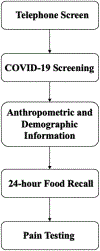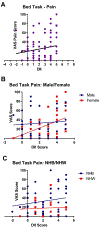Dietary Inflammatory Index (DII) is Associated with Movement-Evoked Pain Severity in Adults with Chronic Low Back Pain: Sociodemographic Differences
- PMID: 35417792
- PMCID: PMC9356984
- DOI: 10.1016/j.jpain.2022.03.237
Dietary Inflammatory Index (DII) is Associated with Movement-Evoked Pain Severity in Adults with Chronic Low Back Pain: Sociodemographic Differences
Abstract
Chronic low back pain (CLBP) is one of the leading causes of pain and disability in adults in the United States and disproportionately burdens non-Hispanic Black (NHB) individuals and females. Approximately 90% of CLBP cases are of unknown cause, and it is imperative that potential causes be explored. It has been reported that diet quality can influence pain state via diet-induced inflammation. The present study assessed the relationship between Dietary Inflammatory Index (DII) and movement evoked-pain severity in people with CLBP and investigated whether race/sex moderated the relationship between DII and movement-evoked pain. Results revealed no significant differences in DII scores between males and females, or between NHB and non-Hispanic White (NHW) participants. Participant sex significantly modified the relationship between DII and movement-evoked pain severity (P = .0155), such that movement-evoked pain severity was significantly impacted by DII scores in females, but not males. Participant race did not significantly moderate the DII - movement-evoked pain severity relationship. These results suggest that diet-induced inflammation may impact the CLBP experiences of females to a greater degree than males. Further research is needed to determine whether dietary interventions that reduce inflammation improve CLBP outcomes and whether these interventions may be differentially-beneficial based on sex. PERSPECTIVE: This article highlights the impact of diet-induced inflammation in a community-based sample as a whole, as well as stratified in various sociodemographic groups. This work expands our understanding of the influence of diet on pain experience and suggests that modifications to diet may be efficacious treatments for reducing chronic pain.
Keywords: Diet; Inflammation, pain; Racial differences; Sex differences.
Copyright © 2022 United States Association for the Study of Pain, Inc. Published by Elsevier Inc. All rights reserved.
Conflict of interest statement
Disclosures: The authors have no conflicts of interest to disclose.
Figures
References
-
- Adjibade M, Andreeva VA, Lemogne C, Touvier M, Shivappa N, Hébert JR, Wirth MD, Hercberg S, Galan P, Julia C, Assmann KE, Kesse-Guyot E. The Inflammatory Potential of the Diet Is Associated with Depressive Symptoms in Different Subgroups of the General Population. The Journal of nutrition. 147:879–87, 2017. - PMC - PubMed
-
- Bahr PR. Race and nutrition: an investigation of Black-White differences in health-related nutritional behaviours. Sociology of Health & Illness. 29:831–56, 2007. - PubMed
-
- Bartley EJ, King CD, Sibille KT, Cruz-Almeida Y, Riley JL 3rd, Glover TL, Goodin BR, Sotolongo AS, Herbert MS, Bulls HW, Staud R, Fessler BJ, Redden DT, Bradley LA, Fillingim RB. Enhanced Pain Sensitivity Among Individuals With Symptomatic Knee Osteoarthritis: Potential Sex Differences in Central Sensitization. Arthritis care & research. 68:472–80, 2016. - PMC - PubMed
-
- Belury MA, Harris WS. Omega-6 fatty acids, inflammation and cardiometabolic health: Overview of supplementary issue. Prostaglandins, leukotrienes, and essential fatty acids. 139:1–2, 2018. - PubMed
Publication types
MeSH terms
Grants and funding
LinkOut - more resources
Full Text Sources
Medical



